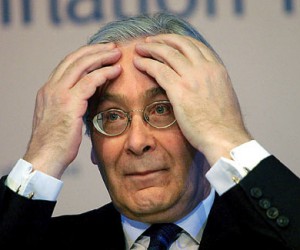As the global financial system is bracing itself for yet another crisis period and a “arduous and uneven” road to recovery, warnings are mounting from many corners of the world that the system of capitalism, as it presently functions, is in dire need of some adjustment and repair if it is to survive. Increasingly political leaders are picking up on the theme, which looks likely to dominate this year’s presidential elections in the United States.
In his annual State of the Union-address last week to the US-congress president Barack Obama set the tone for the election campaign by spelling out what he called a blueprint for a fairer America. He pledged to make millionaires pay higher taxes in setting out his platform in what is shaping up to be one of the most divisive US presidential elections in memory.
His pledge for a fairer America followed in the wake of the front-runner to be his Republican opponet at the end of the year, Mitt Romney being forced to make public his tax returns, which indicated that he only paid 14% tax on an income of more than $21 million.
On the other side of the Atlantic, where so-called austerity measures are fuelling social unrest in a number of countries, the governor of the Bank of England, Sir Mervyn King also last week in a speech warned the business and banking elite to rein in pay and bonuses or risk sparking a rebellion against capitalism in its current form.
In setting out the arduous and uneven path to recovery this year, he said the key to restoring growth would be “above all else ... to maintain support for a market economy and an open trading system”.
King’s fears reflect the recent backlash against capitalism as manifested in theOccupy-movement which spread from Wall Street to many other centres in the developed world and beyond, and last week to Davos where the world’s rich and powerful were meeting.
In the United Kingdom a debate is developing in top political circles about the need to make adjustments to the capitalist system, creating New Capitalism.Terms such as responsible capitalism, popular capitalism, moral capitalism and crony capitalismare increasingly creeping into political debate between the leaders of the major parties.
Voices from the private sector
But it is not just among political and official circles that warnings are being sounded that the system is no longer working for ordinary people. The warnings are also coming from some role-players at the heart of the system.
The investor/speculator of investor/speculators, George Soros, who in February will see the publication of a new book, Financial Turmoil in Europe and the United States, sympathises with the Occupy-movement, which to him articulates a widespread disillusionment with capitalism that he shares.
People “have reason to be frustrated and angry” at the rescue of the banking system at a massive cost largely heing borne by taxpayers, rather than shareholders or bondholders, he says.
In a recent interview Soros said that as anger rises, riors on the streets of American cities are inevitable. But, the response to the unrest could be more damaging than the violence itself. “It will be an excuse for cracking down and using strong-arm tactics to maintain law and order, which, carried to the extreme, could bring about a repressive politcal system (something some obeservers claim is already happening), a society where individual liberty is much more constrained, which would be a break with the traditions of the United states,” he said.s
Speaking at a time when the UK’s ruling coalition was laying out proposal to try to rein in excessive executive remuneration, King said that the “legitimacy of a market economy will inevitably be challenged if rewards go disproportionately to a small elite, especially one which benefited from the support of taxpayers.
"Those taking decisions on remuneration, in the financial sector and elsewhere, need to understand that a market economy rests not just on incentives, but on the acceptance that the distribution of rewards is fair."
He said the growing sense of injustice was because "those who have suffered most have been those who bear no responsibility (for the financial crisis], and who accepted the disciplines of a market economy only to find that others were excused that discipline because they were 'too important to fail'".
Sir Mervyn's comments came as he warned that 2012 would be another difficult year due to continued credit strains, a "global slowdown", and households' efforts to reduce their debt levels. Banking troubles will persist "until the problems in the euro area are resolved", and consumer spending will remain "depressed" despite pressure on family finances easing as inflation falls.
He indicated interest rates would remain at 0.5% all year. "There is scope for interest rates to remain low, and, if necessary, for further [quantitative easing]," he said.
What to do?
But at this stage there does not seem to be any form of concensus emerging about what exactly should be done at a pratical level to fix the situation, both in terms of the symptoms of the problems and the systemic weaknesses that cause the problems.
As Janet Daley of the UK’s Daily Telegraph, commenting on the debate in the UK put it: “What nobody addressed was the specific question of how government could intervene in this matter. That is why they were all – Cameron, Miliband and little Nick – open to pretty much the same criticism: that they were big on moral denunciation and short on practical policy.”
She also posed the question: ”History will have to ask exactly when and why the capitalist club forgot its manners and common sense. Did the collapse of its alter ego, communism, leave a vacuum in which it lost its bearings?
“In the meantime, we need political leaders who will ask the most important question about capitalism: can a free-market economy support an ever-expanding welfare state of the kind that Europeans expect as of right, and even Americans are beginning to contemplate? Somehow I think it’s unlikely that we’ll get a rush of speeches on that theme. “
Emerging markets
Soros believes that if, economically speaking, there is a glimmer of hope for the world in 2012, it lies in the emerging markets. The democratic-reform movement that spread across the Middle East, even reform in Russia may yet drag the world out of trouble.
“While the developed world is in a deep crisis, the future for the developinbg world is very positive. The aspiration of people for an open society is very inspiring. You have hope in Africa lining up for many hours when they are given an opportunity to vote. Dictators have been overthrown. It is very encouraging for freedom and growth,” he said.
He insists that the key to avoiding cataclysm in 2012 is not to let the crisis of 2011 go to waste. “In the crisis period, the impossible becomes possible. The European Union could regain its lustre. I am hopeful that the US, as a political entity, will pass a very severe test and actually strengthen the institution.”






